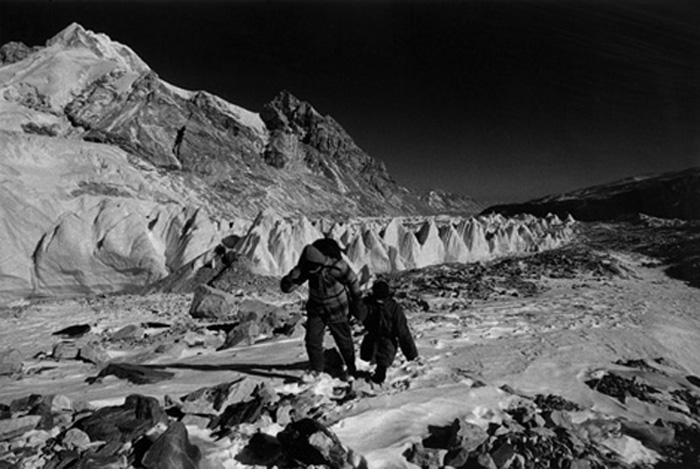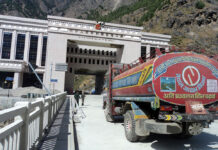
(TibetanReview.net, Jan23’20) – Nepal and China are discussing the modalities for bringing into force an agreement signed during President Xi Jinping’s visit to Kathmandu in Oct 2019 for handing back to each other their citizens who had illegally crossed into the other side’s territory within seven days of being detained, according to local media reports.
China’s official position is that there are no Tibetan refugees in this world, but only those who have crossed the border illegally.
Nepal’s Minister of Foreign Affairs Pradeep Gyawali, offering a written clarification to members of parliament, affirmed that Nepal and China had signed an agreement to handover the people, targeting Tibetans, entering each other’s borders without documents within seven days of being taken under custody, reported english.khabarhub.com Jan 22.
Senior officials at Nepal’s Ministry of Foreign Affairs (MoFA) were cited as saying the agreement will come into effect ‘soon’, as the relevant authorities on the two sides were currently in the process of completing the internal procedures for its implementation.
“It may still take at least one month to bring this into implementation,” myrepublica.nagariknetwork.com Jan 23 quoted an unnamed MoFA official as saying.
However, according to the english.khabarhub.com report, the agreement will officially come into effect from next month with expectations to regulate border and curb cross-border criminal activities but that the government of Nepal seemed to be under influence to enforce it before that time.
“The boundary representatives or competent authorities of both sides shall investigate cases of persons found while crossing the border illegally, ascertain their identities, cross-border facts and reasons as soon as possible and hand them over to the side where they stayed before crossing the border, within 7 days from the day they are detained,” Article 26 (2) of the agreement was quoted as saying.
The myrepublica.nagariknetwork.com report cited experts as expressing fears that the agreement could have been immediately targeted against ‘refugees’ from Tibet who enter Nepal to make a safe passage to India and elsewhere with the help of the UN refugee agency in the country.
The China deal is seen as overriding a ‘gentleman’s agreement’ Nepal had reached with the international community in the early 1980s under which Kathmandu agreed to provide ‘safe passage’ to those fleeing Tibet, adhering to a ‘non-refoulement policy’ on humanitarian grounds. This agreement between Nepal and China will now effectively curb the possibility to anyone illegally entering Nepal from the Chinese side of the border, the report said.
The english.khabarhub.com report cited officials as saying Nepal would stick to its gentleman’s agreement, but only verbally.
The agreement is criticized even within Nepal for not taking into consideration the safety of the persons who might be handed over to their respective country. “As a country upholding a democratic system and values, it is important to ensure the safety of the persons in question once they are handed over to the authorities concerned of their home country. Not taking into consideration the human rights of those being handed over to the country where they belong is against our principled position,” the myrepublica.nagariknetwork.com report quoted former ambassador and career diplomat Dinesh Bhattarai as saying.
The agreement is also said to provide for handing over to the other side those who had crossed the border illegally to their respective country even if they have committed crimes in the country where they are detained.
The myrepublica.nagariknetwork.com report noted that earlier this month Nepal handed over a total 122 Chinese nationals arrested in Kathmandu for their involvement in ‘suspicious activities’. It cited senior police officials as saying the arrests were made at the request of the Chinese side even though Nepali security agencies did not have any credible evidence of their involvement in any criminal activities.
The report cited MoFA as saying the Agreement on Boundary Management System will help ensure effective management of the boundary and contribute toward further strengthening and promoting friendly relations between Nepal and China.
A Nepal-China Joint Commission led by a senior official of the MoFA will implement the agreement which will remain valid for 10 years and will be extended automatically for another 10 years unless notified otherwise in writing by either side before six months of its expiration.
Earlier, following reports that Nepal was likely to sign such an agreement with China, eight US Congressmen, namely James P McGovern, Christopher H Smith (R-NJ), Eliot L Engel, Michael T McCaul, David Price, Steve Chabot, and Pramila Jayapal had written to Arjun Karki, Nepal’s Ambassador to the USA, and sought clarification on the issue. Nepal at that time reiterated its commitment to abide by the international laws, noted the english.khabarhub.com report.





